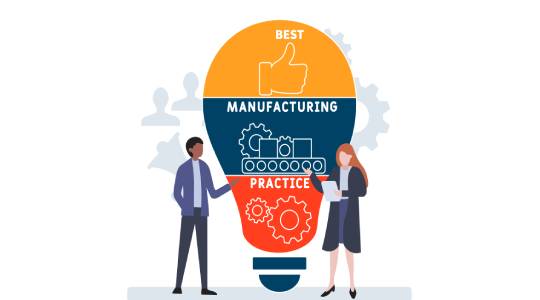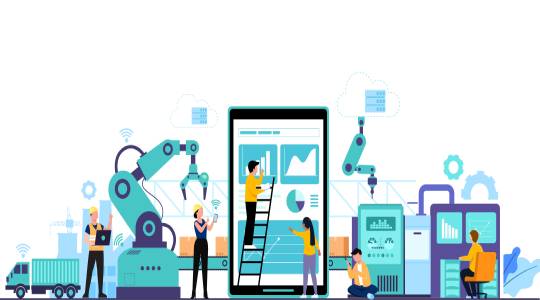The Need for Acceleration of Digital Transformation in Factories
In the modern era, we are witnessing a digital transformation in practically every industry domain, including the manufacturing sector. With the advent of Industry 4.0, manufacturers are realizing the value of Big Data, artificial intelligence (AI), and machine learning (ML).
According to Gartner, manufacturing companies can "gain an edge in a hypercompetitive market" by developing their digital capabilities. 36% of CIOs in heavy manufacturing companies, which have recently experienced major disruptions, believe they are lagging in operating cost competitiveness.
As a result, manufacturers are investing more time and money into their digital transformation initiatives. While some investments are paying rich dividends, most transformation programs are unable to scale up to provide meaningful returns — pointing to the ever-increasing need for accelerated and meaningful digital transformation.
Along those lines, let's look at the top reasons why modern factories need to accelerate their digital transformation journeys.
5 Reasons Why Factories Need to Accelerate Digital Transformation
In the aftermath of the global pandemic, manufacturers are embracing the urgency of digital transformation.
IBM reports that two-thirds of manufacturing companies are accelerating their adoption of digital tools and technologies.
To that end, here are five reasons why modern factories need to accelerate their digital transformation:
- Improve Access to Global Markets
Surveys show that 60% of companies were impacted by disruptions to the supply chain during the global pandemic. As a result, manufacturing companies are looking for alternate sources of supply chains to build more resiliency. Over 40% of manufacturers are considering "reshoring" to improve their sourcing and procurement.
Digital technologies enable manufacturers to tap into global market opportunities. Manufacturers operating in smaller domestic markets see huge growth potential in overseas markets. Even small-to-medium enterprises (SMEs) in the manufacturing sector can leverage their digital capabilities to connect with global customers and demands.
- Develop Resilience to Disruptions
External disruptions (like the global pandemic) can create operational challenges for manufacturing companies. They can lead to production delays or even shutdowns. Operational disruptions can also impact business vendors and cannot be forecasted.
Therefore, manufacturers must build business resilience enabled by digital technologies. Business resilience is about how manufacturers can react quickly to external shocks. For instance, in 2020, as social distancing and remote working became the new normal, 73% of enterprises wanted to invest in remote working technologies.
In that light, it's noteworthy that connected IoT devices can provide real-time monitoring and visibility across the entire manufacturing facility. Similarly, real-time industrial data enables improved data visualization and effective decision-making
- Improve Operational Efficiency
Effectively, digital technologies like AI, IoT, and Edge computing enable manufacturing to extract operational benefits. For instance, using data models, AI and ML technology can automate daily tasks and reduce both operational costs and efforts.
According to Gartner, 36% of manufacturing companies are realizing "above-average" business value from their spending on digitalization. Cloud-based SaaS platforms and IoT sensors are providing access to untapped data across the entire manufacturing cycle.
Modern methods like predictive maintenance are leveraging real-time machine data to predict and prevent machine failures, thus reducing downtime costs. Manufacturers can also improve their OEE through real-time data analysis.
- Secure Manufacturing Data
77% of manufacturing companies rank cybersecurity as their topmost priority. An SBA survey found that 88% of small businesses are vulnerable to cyberattacks. With the growing number of connected IoT devices in manufacturing, there is a genuine concern for data privacy and security.
Data security is among the key challenges for companies moving toward implementing Industry 4.0. As such, manufacturers can no longer adopt a reactive approach to data security. And to improve their cybersecurity, companies are now migrating their workloads to the cloud platform. That said, an AI-driven security system can help companies detect cyber threats early and mitigate them faster.
Also Read: Identity Your Perfect Starting Point for Your Industry 4.0 Journey
- Improve Business Decision-Making
Across the manufacturing domain, most business decisions continue to assume the "status quo" and do not adapt to business disruptions and changing needs.
As the manufacturing industry becomes more data-centric, companies are unlocking the true potential of Industry 4.0. Driven by advanced data analytics from device sensors and robots, smart manufacturing can improve the overall decision-making process. Digital manufacturers now have end-to-end visibility across their operations, including production, supply chains, customers, and inventory management.
Thus, digital technologies support a bold and effective decision-making process that can resolve bottlenecks and deliver high-quality products to customers. Data-driven decision-making provides manufacturers with a clear advantage over their closest competitors.
Conclusion
In the modern manufacturing era, factories can no longer rely on legacy systems and applications. They can only leverage the benefits of Industry 4.0 by accelerating their digital transformation programs.
Having said that, the path to end-to-end digital transformation is not achievable without the right technology partner. With its extensive experience in the manufacturing domain, Delpheon provides customized industry solutions in real-time production monitoring and discrete manufacturing.
Explore how Delpheon can help in accelerating your digital transformation journey. Request a product demo now!



